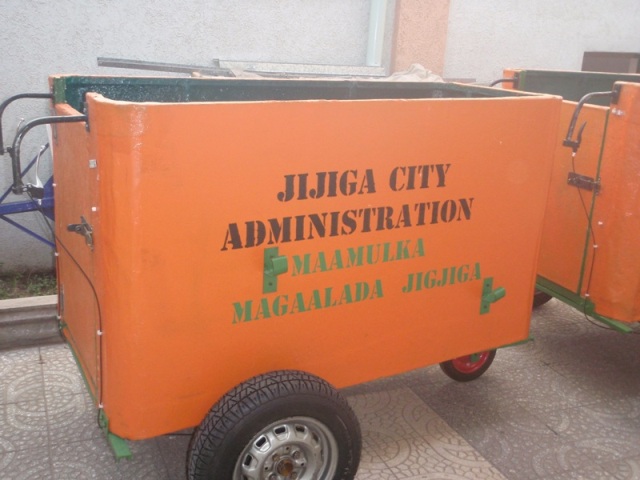
As ICMA’s USAID-funded CityLinks™ program in Ethiopia neared its end, the mayor and city manager of Jijiga, one of the cities that benefited, expressed thanks for the improvements the program made possible. In Jijiga, sound municipal services are particularly important as the city faces population pressures created by in-migration of post-pastoral people—those who previously herded livestock in outlying open lands.
Using peer-to-peer exchanges, the Regional/Municipal Services Strengthening (RMSS) project has worked to build the capacity of selected Ethiopian cities and regions in strategic planning, revenue generation, sanitation, organizational development, and emergency preparedness and response. In Jijiga, the program helped improve sanitation and solid waste management by:
- Establishing a public-private partnership between the city administration and two waste collection cooperatives
- Providing training and equipment, including protective gear and collection push carts designed for the city’s narrow streets
- Developing a cost recovery scheme for waste collection services
- Providing office equipment and training to enable local staff to use geographic information system (GIS) software to plan and track solid waste collection.
Because of government restrictions, ICMA has implemented the RMSS in Jijiga through a partnership with Mercy Corps, a locally placed nongovernmental organization.
In a letter to the RMSS team, Mayor Suldaan Maxamed Xasan noted “remarkable positive impacts.” He cited “the visible transformation of service delivery into a public-private partnership arrangement, the strengthened performance of the department of sanitation and beautification, and the substantial material support to the department and cooperatives.”
The onsite team also interviewed Najib Idris, Jijiga’s city manager. As manager, Idris is the local chief executive officer, appointed by the president. He has spent four years in government service and was appointed to his post in Jijiga seven months ago. Before that, he was city manager in Dire Dawa, and he expects to move on to another appointment in a few months. Unlike professional managers in the United States, city managers in Ethiopia move among municipalities in very short order—so they have to be “quick studies” who can make decisions based on their knowledge of the local government system as much as on extensive collection of local data.
Idris said the public-private partnership was very effective and brought about positive changes in government service provision. “People were very happy with grassroots participation as a new approach. This gave the government a chance to be a true leader, and everyone benefitted. The government led the program and worked with the citizens, and this has never happened before. The private sector also is doing a good job, and I hope this model can be used in other cities.”
Here are additional excerpts from the interview:
Q: What other benefits have there been?
A: The local economy has been empowered, and the [sanitation] work is now a source of employment for youth. Also, the partnership makes work easier for both the local government and the private sector, because solid waste management is now done in a professional way. The local government doesn’t have to worry about trash collection, and the impact on water quality and drainage is positive. People now don’t throw trash in the water bodies and ditches.
Q: Did you see a benefit from the RMSS training and technical assistance?
A: Yes. . . The Sanitation and Beautification Department is much more efficient now, and through RMSS capacity building we did a restructuring of the department. We now have a municipal proclamation that defines the department, and so the department is now stronger and more independent, with its own budget.
Q: It seems that post-pastoral people are moving in from outlying areas. What can the municipality do about providing land to them? And if you provide excellent services, and maybe land, won’t Jijiga face a huge population buildup?
A: We will have to continue to build our capacity and seek a balance as the people move in and need services. We are also careful about migrants competing with residents for jobs and lands.
Q: The RMSS project stressed capacity building within the municipal administration to meet challenges like these. Tell us about the current municipal structure and the specific departments that are in place to meet land-related needs especially. Is there a new land law coming next year?
A: There will be a new land law, but we have one now. We have a diaspora office for returnees, a disaster preparedness and prevention office, and a land use office. We have a staff shortage. For example, we have a Master Plan that includes a land use plan, but no one specifically assigned to it.
Q: Let’s assess the future in terms of the impact of in-migration. What municipal services will be stressed?
A: It’s obvious that water service and solid waste will be the most affected. We need to empower these departments to be more independent and to be effective in extending services. Migrants are coming to us . . . because the lack of jobs in other places is making Jijiga more attractive.”
To learn more about ICMA’s international activities, browse the International Development topic or e-mail international@icma.org.
New, Reduced Membership Dues
A new, reduced dues rate is available for CAOs/ACAOs, along with additional discounts for those in smaller communities, has been implemented. Learn more and be sure to join or renew today!
